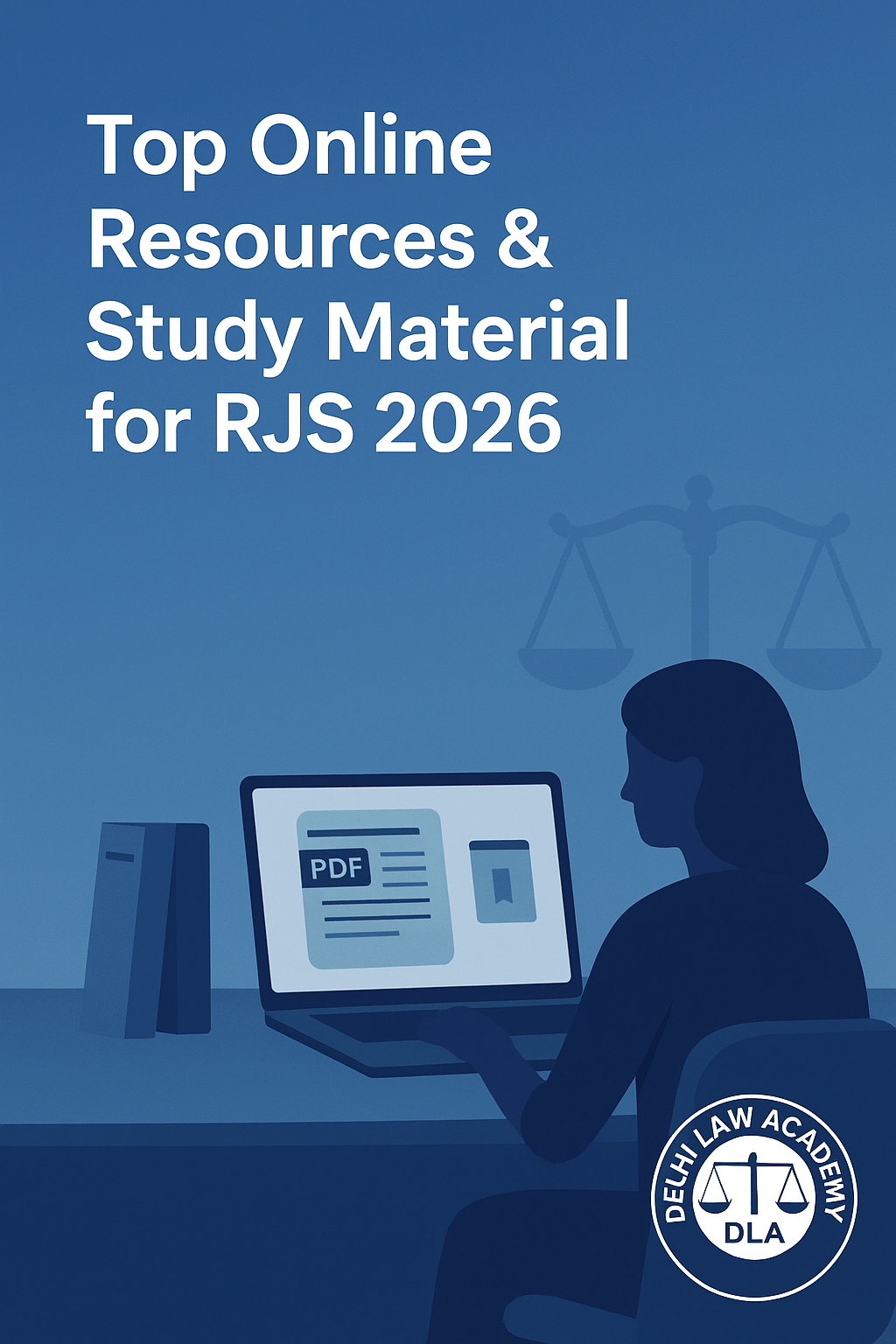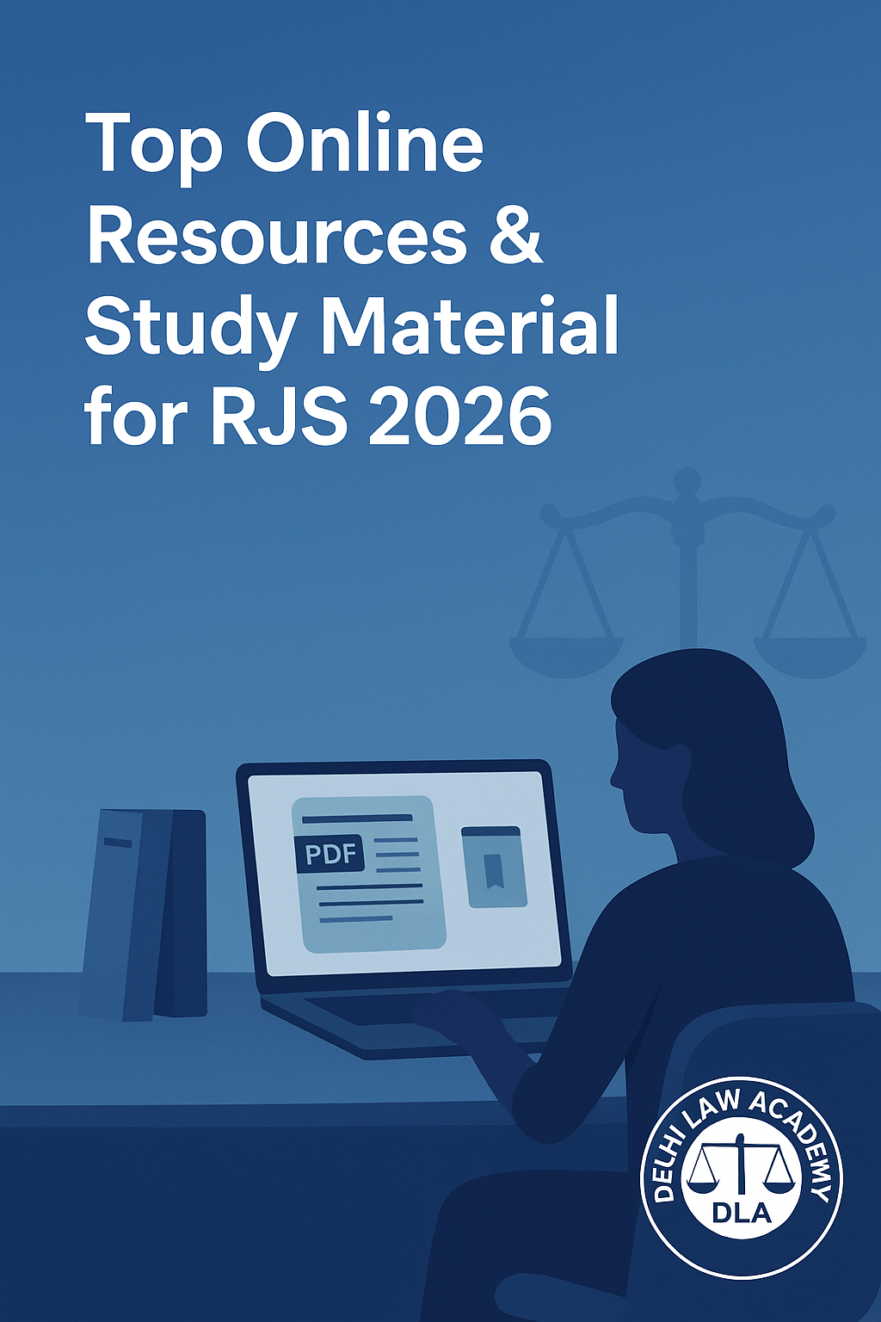
📚 Further Reading on RJS Mains Preparation
To help you prepare effectively for each part of the Rajasthan Judicial Services Mains Examination, explore these in-depth guides:
Frequently Asked Questions
Online Resources & Study Material for RJS Mains
Curated links and guidance for Rajasthan Judicial Service exam: official PDFs, standard books, free resources, coaching notes, and mock tests.
🏛️ Official Resources (Start Here)
- 📄 RJS Notification & Syllabus PDF – Always verify from the competent authority’s official website.
- 🧾 Eligibility, Exam Pattern, Dates – Track updates only from official channels to avoid rumours.
- 🗂️ Previous Year RJS Papers – Download authentic question papers with answer keys where available.
💡 Tip: Save official PDFs locally and highlight key points using a PDF reader. Create a folder named RJS-2026-Official.
📚 Standard Books (Core Reading)
Build your legal foundation with standard texts; supplement with Bare Acts and case-law updates:
Law Subjects
- ⚖️ Bare Acts with succinct notes (IPC/BNS, CrPC/BNSS, Evidence/BSA, CPC, Contract, Torts, Constitution).
- 📘 Constitution: a concise, exam-oriented text + landmark case compendium.
- 📕 Civil & Criminal Procedure: one standard text each + flowcharts.
- 📗 Contract/Torts: crisp concept books + illustrations.
General Studies (Prelims)
- 🇮🇳 Polity basics (quick-revision book).
- 🧭 History/Geography briefs for Rajasthan-focus.
- 🧠 Current Affairs monthly compilations.
✅ Strategy: For Mains, prioritize answer writing + case citations over mere reading volume.
🌐 Free Online Resources (Use Wisely)
- 🧾 Free study material from trusted sources (ensure latest amendments).
- 🔍 Blogs and other updates through reputable legal institutions.
- ▶️ Concept videos for tricky areas (use as reinforcement, not as sole prep).
- 📰 Monthly legal & current affairs for quick updates.
⚠️ Caution: Cross-check every free PDF/summary against an authoritative source before relying on it for Mains.
📝 Coaching Notes & Curated Compilations
Well-structured notes save time, ensure coverage, and add exam orientation (recent case law, probable questions, drafting formats):
- 📚 Subject-wise concise notes aligned to the RJS syllabus.
- 📑 Case-law updates with one-liner takeaways.
- 🗂️ One-pagers & charts for last-week revision.
🎯 Mock Tests, PYQs & Answer Writing
- 📝 Prelims Test Series: 10–15 full-length tests with analytics and negative marking simulation.
- ✍️ Mains Writing Practice: 6–8 evaluated tests; focus on structure, issues, citations, and clarity.
- 📂 Previous Year Questions (Topic-wise): Identify repetition patterns and weightage.
💡 Pro Tip: Maintain an error log for both Prelims & Mains. Revise it weekly.
🧠 Smart Tips to Save Time
- ⏱️ Time-blocking: Split daily slots into Reading, Revision, Writing.
- 🧾 Active recall: Create mini-question banks from your notes.
- 📌 Case anchoring: Tag each topic with 1–2 landmark cases.
- 🔁 Spiral revision: 7–21–45 day revision checkpoints.
📥 Useful Downloads & Checklists
- ✅ RJS Syllabus Checklist (printable)
- 🧾 PYQ Tracker (topic-wise)
- 🗓️ 90-Day Mains Plan (editable)
📣 Ready to Study Smarter?
Get structured notes, updated case-law, and guided test series crafted by experienced faculty.
Start with official notifications and syllabus PDFs, then add standard books, authentic Bare Acts, previous year papers, and a structured mock test series. Curated notes (with case-law updates) save time and give exam focus.
Attempt PYQs in timed conditions, then analyze topic-wise patterns, difficulty, and common traps. Create an error log and revise those concepts weekly. For Mains, convert PYQs into practice answers with issue–rule–analysis–conclusion structure.
Books give depth; notes provide exam orientation—concise provisions, landmark cases, and likely questions. Using both accelerates revision and helps with Mains answer structuring and citations.
Target 10–15 full-length Prelims mocks with negative-marking simulation, and 6–8 evaluated Mains tests. Review each test thoroughly—spend more time on analysis than on taking another test.
Adopt a 60–40 split: concept reading + Bare Acts (40%), active recall & revision (20%), Prelims MCQs (20%), and Mains writing (20%). As Prelims nears, shift to 70–30 in favor of MCQ practice and rapid revisions.
Use authentic government portals and reputable legal databases for Bare Acts and judgments. Supplement with monthly case-law digests and coaching updates to keep your citations current for Mains.

